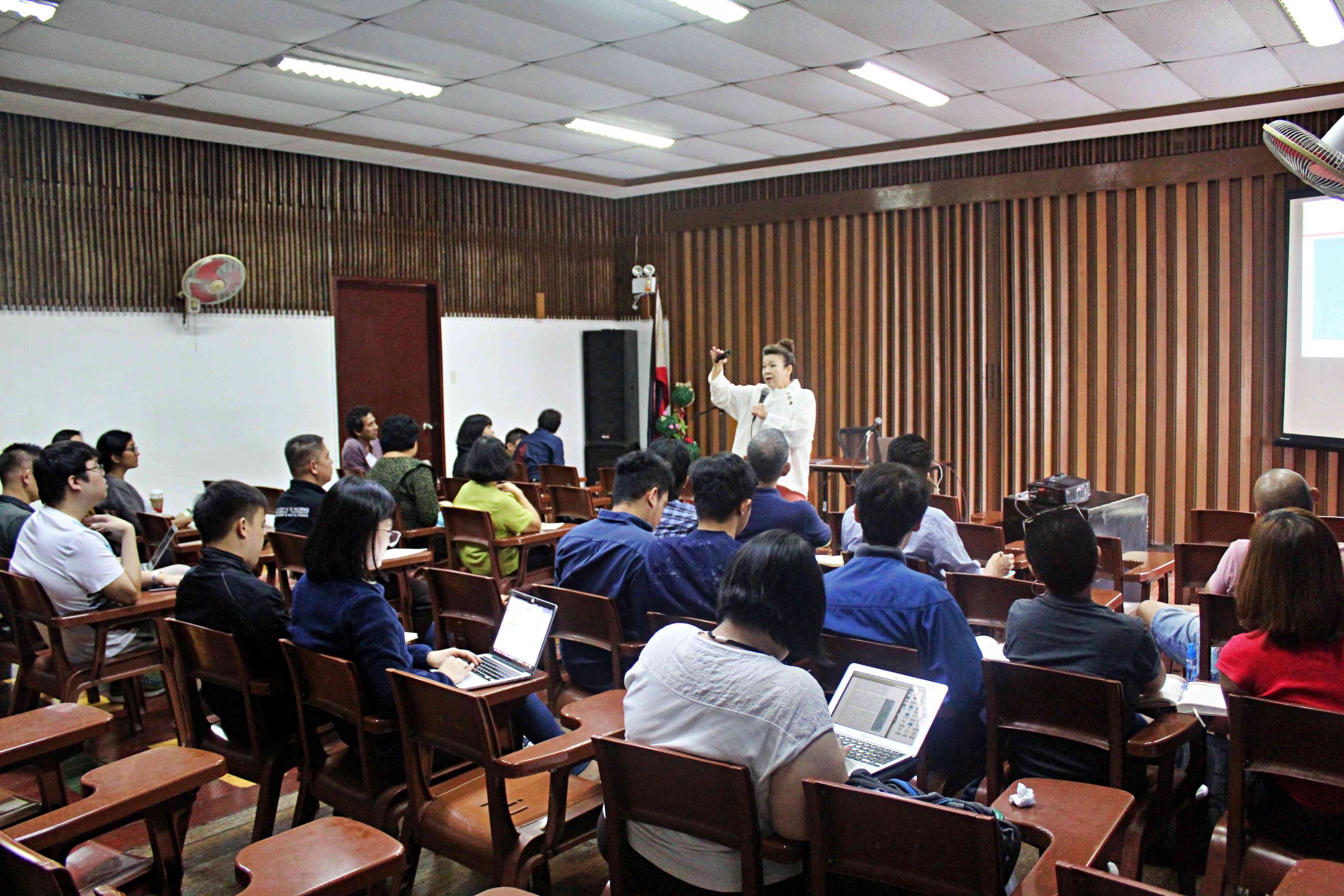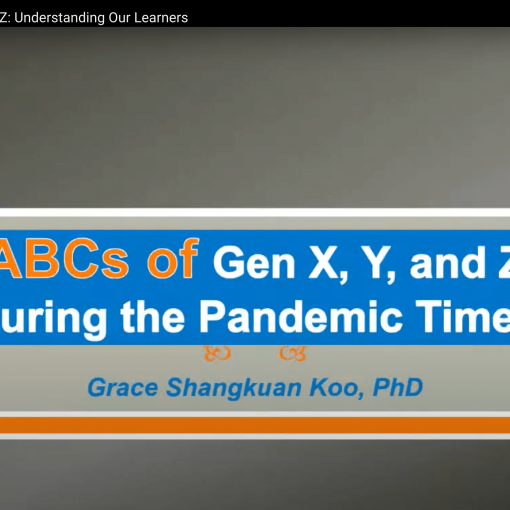Please see Dr. Koo’s answers to the questions not addressed live during The ABCs of GEn XYZ: Understanding Our Learners Webinar held last 23 November 2020. The recording of the webinar is available here.
Given the generational differences, do you think that a baby boomer can effectively develop self-learning modules for Gen XYZ and alpha gen? If so, in what ways?
- Each generation has new formats or strategies of teaching, but theories and principles of learning do not change constantly. A good educator should therefore learn about and understand the various theories of learning and epistemologies, read constantly on the subject, and catch up with the modes of delivery. Self-paced individualized learning has been around for decades. The so called “modules” nowadays are not new. The only thing new is the mode of delivery – through newer technological means. So why should baby-bloomers not be effective? The tools should not be confused with the knowledge.
Which type of learner do you prefer to teach, the gen x, y or z? Why?
- Each generation has its own strengths and weaknesses. The Gen X write better than the late comers because they deliberate and elaborate on their thoughts. Gen Y are more spontaneous, impulsive – can give quick, short answers but are less inclined to participate in discourse. Although I haven’t taught Gen Z, I would think they are less shy to say what they want, but with shorter attention span, they might encounter problems in motivation – in terms of sustaining and persisting on a long-term project – whether alone or collaboratively. I enjoy teaching in multi-generational classes. I have taught 2 pairs of parent-child students – a mother and her son, and a mother and her daughter, separately, but I could see the familial influences of parents on their children. So even if we are born in different generations, the family environment certainly is an important factor in learning.
Do [sic] UP now encourage interdisciplinary type of undergraduate researches? Can you cite some examples in your college?
- UP does encourage collaborative research work among faculties. As far as I know, however, it is not a rule or policy that students have to work in collaborative research. I do have had opportunities to be interviewed by students from different colleges – Architecture, Music, Linguistics, Psychology, Home Economics, Mass Com on their group theses. Educational Psychology’s interest is broad and covers many subjects on what makes better classroom, communication, parenting, etc.
Given the realities that there is a bit of “digital divide” between the Gen Z and the earlier generations, and in a way this made some of the Gen Z students feel entitled towards their teachers, how can we be able to address this issue?
- Entitled in what ways? A sense of entitlement is mostly a result of being spoiled by affluent parents. Hence, equity and fairness should be established by a teacher since Day 1. An excellent teacher who has high personal and professional standards, is self-respectful, confident, competent in his/her discipline and one who manages a classroom well – establishing implementable rules – will prevent many behavioral problems in class.
How do you address the gap between learning “just in time” and teaching “just in case”? For example, many young students like to learn the “application” without the “theory” because they say the “theory” is not directly relevant to their target work.
- Both teaching ‘just in time’ and teaching ‘just in case’ are important. A professor should demonstrate how his/her lectures are timely – relevant in modern times and contexts. On the other hand, a professor must not assume that the students have prior knowledge to appreciate and understand the current topic fully, hence, the introduction (or activation of topic and thought on the topic) should be prepared so well such that the students can connect the dots.
My question is on the difference between the students’ preference vs that of the educator. Would this mean that educators’ must adjust based on the students’ preference?
- No, teaching-learning style matching is not possible in a class, nor has research studies concluded its effectiveness. What a teacher can do is to use various teaching approaches that appeal to different kinds of learners and require various assignments that learners with different strengths can shine.
In the transition to remote learning, I am most affected by being “always on/ always online”— so different from the old f2f normal. Even with the attempt to segregate wfh and personal time, this seems to be a ubiquitous imperative. How do you address the mental burden of this in these covid times?
- Everyone who works from home should set his/her own boundaries. Structure your time and structure your space so that you can work for at least a number of hours a day without disturbance. Do not read or respond to work-related communication after a particular time. Turn off your gadget when you need to rest at night. Do not go over a certain time for social media. Do not let others rob your time.
How will I apply this to non-reader or slow reader students and even to Indigenous People, yet they belong to GenZ?
- Reading literacy proficiency is important in whichever generation and communities. Teachers should themselves be models of reading. If teachers are not reading, they would not motivate their students to read. Moreover, teachers should advocate reading – making reading a course requirement, check on what their students are reading, and tell stories from their reading and introducing good books. For IP students, teachers need to research on local writers and introduce local books as part of student reading requirements, either on print or making them online.
Should students be involved in designing curricula and syllabi? Or how much should they be involved? Curricula and syllabi are for the benefit of the present students for the society of the future. However, the designing of curricula and syllabi is a task for the older generation who are prescribing outcomes, skills and values from their own days.
- Good question and comment. A good syllabus should have the present and future in mind. Your students will teach the future generation. A curriculum does not change every year, but a syllabus does. People confuse what makes a curriculum. A curriculum is dynamic – not a piece of paper. A curriculum includes not only the objectives and topics of the course, but also who the teacher is, the methods of teaching, the breakdown of learning process, the student differences, the evaluation of requirements. A curriculum is dynamic; it is dynamic. While revision of curriculum is called after a period of time, who the teacher is actually what makes the most difference. Look at the TIMMS and PISA recommendations. The curriculum is not the problem, it is the teachers, the thinking demands, the assessments that do.
What do you tell your students who find no meaning to life?
- Meaning of life is an existential issue that troubles many teachers and students. The most important questions in life (Where do I come from? Who am I? Where do I go?) or philosophy of life serves as the foundation of one’s philosophy of education. A teacher who finds his life and work meaningful and significant, living a life full of zest and excitement can model for his/her students what makes a worthy life. My Christian faith gives me a strong foundation of life philosophy – that in whatever I do, work at it so well as working for the Lord, and in all things to glorify God and to serve others.



